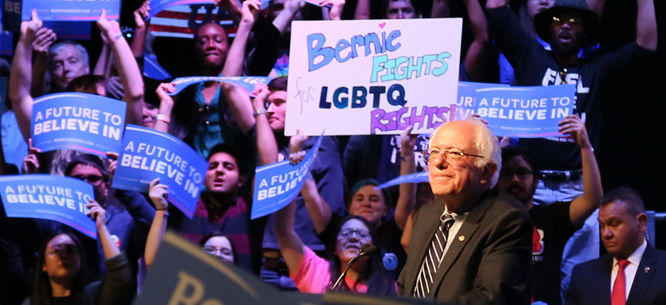The Next Majority
TBF Note: Congratulations to Bernie Sanders on wins in Oklahoma, Colorado, Minnesota & Vermont (and nearly Massachusetts - where shenanigans involving Bill Clinton were occurring - more about him below). Forward!
The zero-sum nature of elections often causes us to miss the ways in which a loss can also mark a victory. Barry Goldwater lost his presidential bid in 1964 to Lyndon Johnson. But his presidential campaign helped pave the way for the next generation of conservative politicians in the Republican Party. Sanders has not lost yet. But even if he does, a sea change already appears to be under way. A new generation of liberal Democrats and radical activists is emerging, hoping to push the Democratic Party to the left. This is not a silent majority. It is outspoken and willing to do what it needs to be heard.
The Next Majority
David Marcus ▪ March 1, 2016
Ever since Nixon uttered the taunt a year after cruising past Hubert Humphrey in 1968, Democratic Party elites have been in hot pursuit of the “silent majority.” The Coalition for a Democratic Majority rose to the challenge in 1972 and tried to recapture the Democrat’s working- and middle-class base by resurrecting the party’s more hawkish Cold War policies. The Democratic Leadership Council (DLC), founded after Reagan’s crushing defeat of Walter Mondale, went even further. Composed mostly of young southern and midwestern Democrats, the DLC tried to roll back much of the state-centered liberalism of the New Deal and Great Society. Arkansas’s popular governor Bill Clinton carried the momentum of this strategy, becoming the DLC’s chair in 1990 and winning the White House in 1992. He was the second Democrat to have done so since the late 1960s.
The rise of Clinton and the “New Democrats” also came with significant political and human costs. They may have won a new majority for the Democratic Party. But they also turned against many of their constituents. With the passage of NAFTA, large swathes of industrial workers found themselves out of work. With the Personal Responsibility and Work Opportunity Act in 1996, Clinton got rid of “welfare as we know it.” And with an omnibus financial deregulation bill in 1998, the party eroded many of the constraints that kept American banking from the types of practices that led to the crisis of 2008. Seeking a “third way” between the liberal egalitarianism of the old Democrats and the free-market orthodoxies of the Reagan Republicans, Clinton ended up not only alienating much of the Democrats’ young, black, and working-class bases; he helped diminish the differences between the parties. The party of “big government” had become, like its rival, a party for big businesses.
It was into this political world that my generation came of age in the early and mid-2000s. September 11 and the catastrophic “war on terror” that followed were the hallmarks of our coming of age, bringing many of us out into the streets and into politics for the first time. But so were the experiences of economic uncertainty and precarity created by policies of the Clinton and New Democrat years. None of us wanted another Republican in office. But it was also unclear how the Democrats, still under New Democrat control, could offer us much of an alternative ...
More here:
https://www.dissentmagazine.org/blog/next-majority-sanders-democrats-party-insurgency

